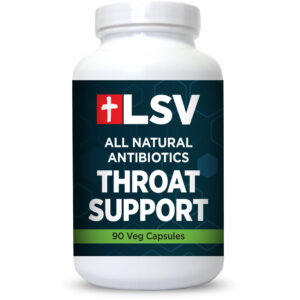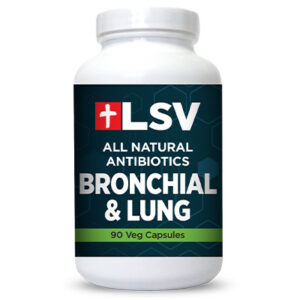Our Company
LSV
SINCE 1992
Founded in 1992, in Winter Park, Florida – LSV Vitamins has been the leader in All Natural Antibiotic supplement sales for over 30 years in the United States.

Turmeric, the golden spice that graces countless dishes, has long been revered for its medicinal properties in traditional medicine. Modern science is now exploring its potential health benefits, including its possible role in combating bacteria. While not a replacement for antibiotics, turmeric offers an intriguing glimpse into natural antimicrobials.
The vibrant yellow color of turmeric stems from curcumin, its most studied bioactive compound. Curcumin exhibits various biological activities, and its potential antibacterial properties are a cause for excitement. Studies suggest curcumin may disrupt bacterial cell membranes, hindering their growth and survival. Additionally, curcumin may interfere with bacterial communication, making them less effective at causing infections.
. While research on curcumin’s antibacterial properties is encouraging, there are limitations to consider Most studies have been conducted in labs, using isolated bacteria and concentrated curcumin extracts. Translating these findings to real-world scenarios, where curcumin is consumed as part of a meal, requires further investigation. Additionally, the human body’s ability to absorb curcumin is limited, raising questions about its effectiveness at achievable dietary doses.
The emergence of antibiotic-resistant bacteria is a growing global concern. Interestingly, some research suggests that curcumin, when combined with conventional antibiotics, may enhance their effectiveness. This combined approach could potentially combat antibiotic resistance, but more research is needed to confirm this possibility [4].
The potential of turmeric as a natural antimicrobial agent is interesting. However, it’s crucial to remember that antibiotics, developed through rigorous scientific testing, remain the primary line of defense against bacterial infections. Turmeric should not be used as a substitute for doctor-prescribed antibiotics.
If you’re interested in exploring turmeric’s potential health benefits, incorporating it into your diet is a great way to start. Turmeric can be enjoyed in curries, smoothies, or even golden milk lattes. However, for specific health concerns, consulting your doctor is essential. They can assess your individual needs and advise you on whether turmeric supplements might be a suitable option.
The research on turmeric’s antibacterial properties is ongoing, and future studies may shed more light on its potential as a natural approach to bacterial issues. However, for now, antibiotics remain the primary tool for combating bacterial infections.
LS Vitamins – Since 1992
See All of our effective All Natural Products Here
All Natural Antibiotics Cold & Flu
All Natural Antibiotics Sinus Support
All Natural Antibiotics Teen Support
All Natural Antibiotics Tooth & Gum
All Natural Antibiotics Bronchial & Lung Support
All Natural Antibiotics Throat Support
Below are a number of statistics that help describe how antibiotics are currently being prescribed in outpatient settings in the United States and how these practices are contributing to the larger issue of antimicrobial resistance.
The possibility of antibiotic side effects can be frightening, but it is important to remember that their proper use has saved countless lives. Those using antibiotics should report any possible negative reactions to their doctor immediately. In some cases, doctors will have their patients continue using a specific antibiotic if the side effects are mild; in others, the doctor will switch the patient to another drug.
For Over 30 Years, we have 3rd Party Tested each and every nutrient that go into all of our products: Purity & Effectiveness is how are product continually works for Tens of Thousands of our Customers.
By no means are we at LSV Vitamins saying do not take what your doctor prescribes, we are just saying that we have an alternative for those who cannot take Antibiotics, afraid one of the many side effects, or simply want to try an all-natural alternative. We have a large number of people (over 100,000) who take and have taken this at the first sign of a problem, and it works well. As always, consult your doctor.
*Disclaimer: None of the above statements have been evaluated by the FDA. These products are not intended to diagnose, treat, cure or prevent any disease. As always, consult your physician before taking any supplements. LSV. Individual results may vary.
 Throat Support - Natures Antibiotics
Throat Support - Natures Antibiotics
 Bronchial & Lung Support - Natures Antibiotics
Bronchial & Lung Support - Natures Antibiotics
LSV
SINCE 1992
Founded in 1992, in Winter Park, Florida – LSV Vitamins has been the leader in All Natural Antibiotic supplement sales for over 30 years in the United States.